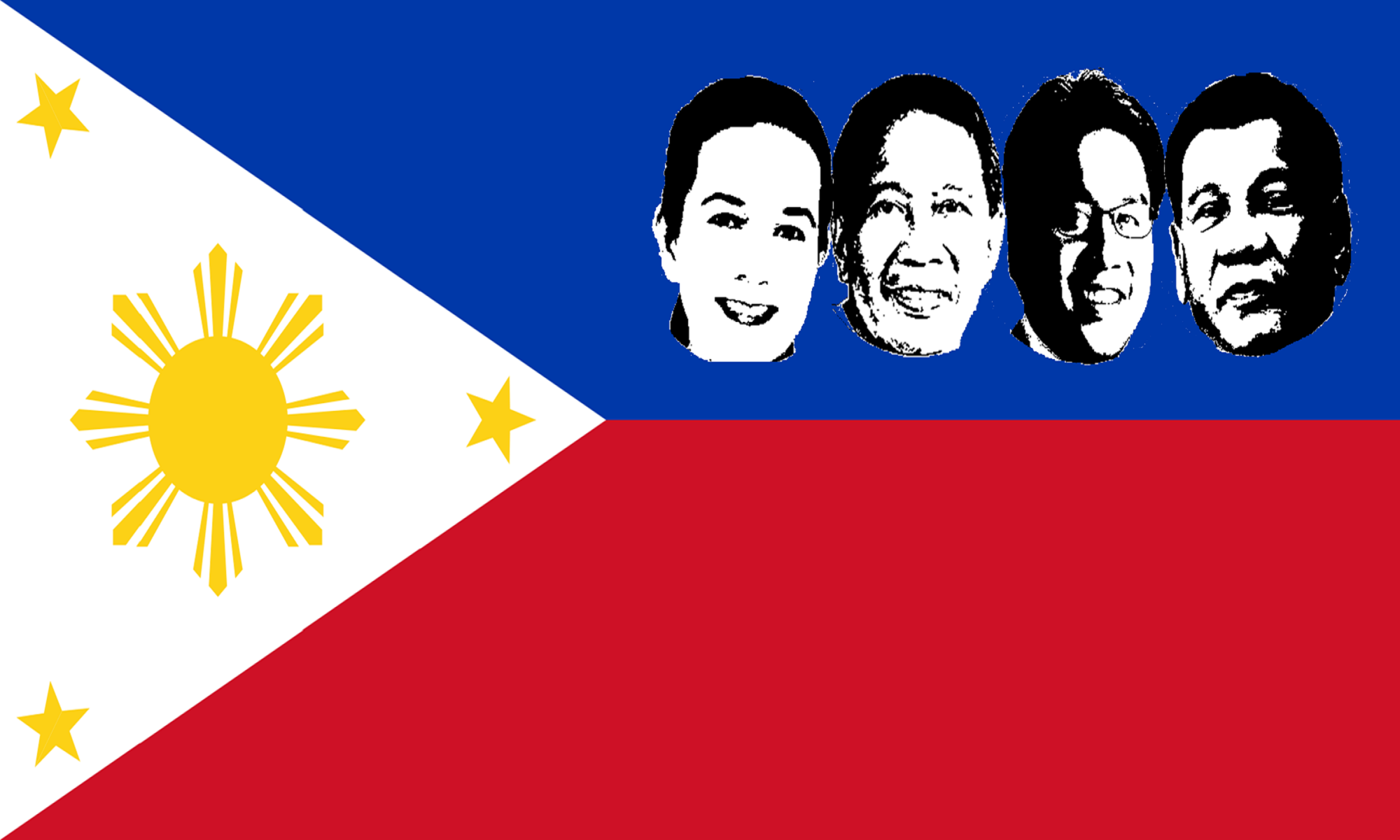Will post-election Philippines continue to be conducive for FDI? | The stance of the presidential candidates
|
Once considered the “Sick Man of Asia”, the Philippines has seen rapid economic progress in the past six years under the leadership of President Benigno Aquino. The country has risen from decades of political instability, a boom-and-bust economy and inherent corruption, to become the second fastest growing economy in the world in 2015. With only months left in his six year term, the popularity and approval of President Aquino remains high; however, the Filipino Constitution bars a second term in office for the President. As the battle to replace him heats up between Grace Poe, Mar Roxas, Jejomar Binay and Rodrigo Duterte ahead of the General Elections on the 9th of May, investors are concerned over how conducive an environment for Foreign Direct Investments (FDI) his successor will strive to create. |
A four horse race to the hot seat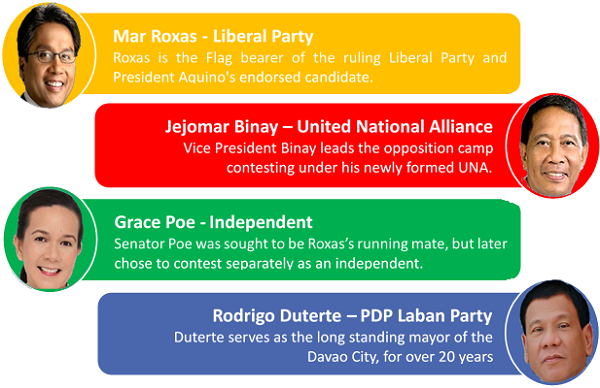 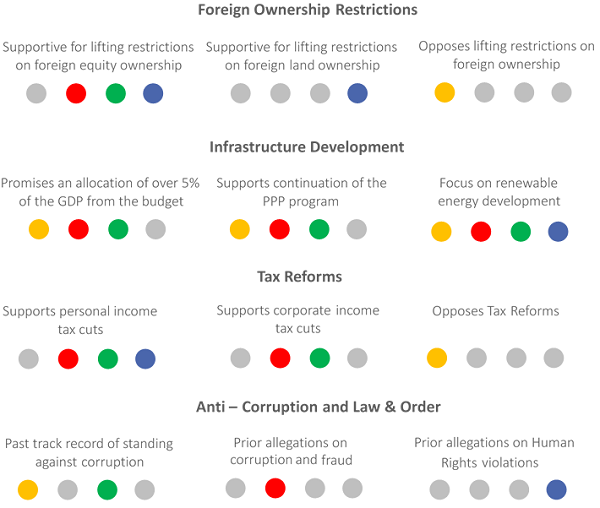 |
The outlook for FDI positive as Poe continues to lead in a tight battle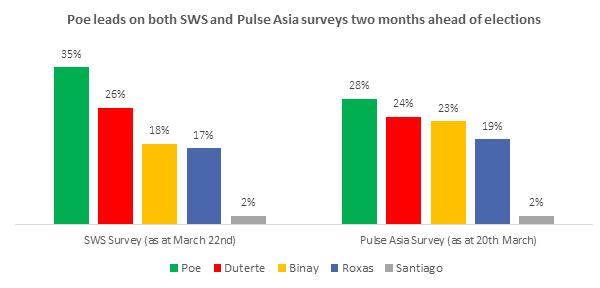 Source: SWS/Pulse Asia |
|
The latest (late March) SWS and the Pulse Asia surveys indicate Senator Grace Poe leads the pack. However, she does not still command a convincing majority over her counterparts. Poe comes across with a market-friendly, liberal outlook supportive for much-needed constitutional and tax reforms for the Philippines to remain competitive in the region. Thus, standing on an election platform that seems to bring the best prospects for potential investments. Despite a more stringent stance towards tax and constitutional reforms, Mar Roxas as the Liberal Party flag bearer, is likely to create a stable environment for investments underpinned by the good governance and sound economic policies that were once proven successful under the Aquino administration. Similarly, notwithstanding his populist attitude and alleged corruption, under Vice President Jejomar Binay, the investment backdrop will continue to remain largely positive, owing to his extensive experience in the political landscape, the pledge to continue with anti-corruption measures and the focus on a far-reaching infrastructure development. The Davao City Mayor – Rodrigo Duterte continues to be the wild card; as his ambiguous policies, alleged human rights violations and the strong law and order platform are likely to create uncertainty among investors. The overall direction for investors ahead of the May elections should be “cautious but optimistic”. As the commitment of the presidential hopefuls to continue on the anti-corruption platform, along with improved infrastructure and reduced bureaucratic red tape should bode well in brightening the prospects for FDI into the growing Filipino industries. |
From good governance to good economics: FDIs triple under Aquino governmentDuring the Aquino administration (2010-2015), the Filipino economy grew at a CAGR of 6.2%, on the back of a pro-reform and anti-corruption policy platform, compared to a CAGR of 4.4% during 1999 to 2009. This positive economic performance saw Philippines being notched up into investment grade by global credit rating agencies in 2012 (S&P: BBB, Fitch: Baa2 and Moody’s: BBB-). The country remains at its best debt position in 18 years, with a Debt to GDP of 44.8% in 2015 (lowest since 1996 and down from 54.8% in 2009) and stands on a budget deficit of under 1% of GDP in 2015, following strong fiscal consolidation efforts. Net FDIs into the Philippines grew at a CAGR of 34.4% over 2010-2015 due to rekindled investor confidence against this encouraging economic backdrop; a threefold increase in 2015 to USD 5.72 billion from USD1.3 billion in 2010, when Aquino assumed office. 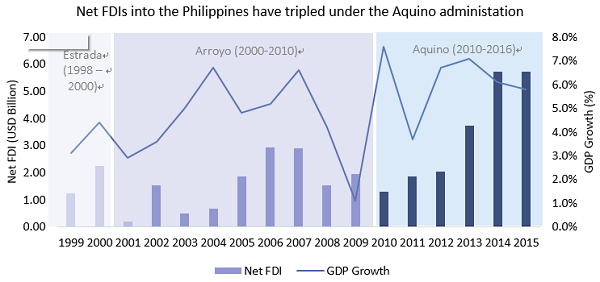 Source: The Bangko Sentral ng Pilipinas/World Bank
Despite the sizable inflow of FDIs into the Philippines in recent years, the country continues to lag behind in the ASEAN region. Even as the FDI inflows reached an all-time high in 2014 (USD 6.20billion), the Philippines was placed 6th in the ASEAN region and last among the ASEAN-6 in terms of FDI inflows. Out of the total FDIs into the ASEAN in 2014, the Philippine’s share amounted to 3.2%, which is one-tenth of the investments into Singapore, one-third of Indonesia and half of Thailand. 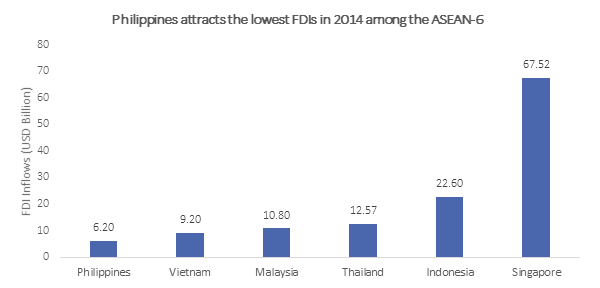 Source: World Bank
The poor competitiveness compared to other countries in the ASEAN can be attributed to a) constitutional restrictions on foreign asset ownership, b) the inherent corruption and red tape and, c) the lack of adequate infrastructure. Thus the challenge, now that the Aquino administration has transformed Philippines into an economic bright spot worthy of attention, is to maintain momentum and overcome the shortcomings the present government has left unanswered. |
All candidates vow to follow the “Straight Path” – the Aquino philosophy of good governanceThe subject of good governance and anti-corruption was at the forefront of Aquino’s campaign in 2010. Delivering on the promises made, President Aquino’s efforts on anti-corruption and policy reforms has led to a more transparent business environment within the country. According to the Ease of Doing Business Index, the Philippines was ranked 103rd in 2016, notching up over 30 positions compared to 134th occupied in 2010. Overall, the good governance practices has been a key driver in luring investments to the Philippines by reinforcing the investor confidence through a transparent policy platform, and will continue to remain a priority for the new administration. 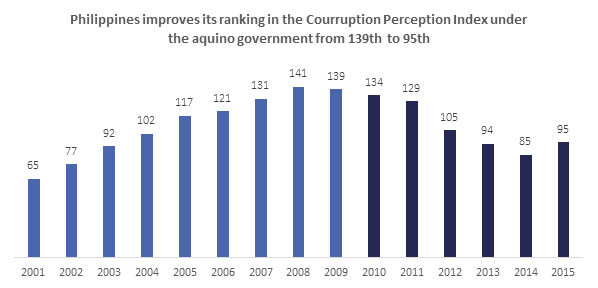 Source: Transparency International
Mar Roxas of the Liberal party vows to carry forth the “Straight Path” – the Aquino philosophy of anti-corruption and good governance. However, the rest of the pack have also endorsed the “Straight Path” and promise continuity of Aquino’s efforts to lead the country corruption-free. Senator Grace Poe comes across with a clean image, brought about by her participation in the Senate’s investigations into corruption cases of government officials. Poe also authored several Senate Bills aiming to strengthen the capacity of investigating and prosecuting government officials accused of crimes and is likely to follow through on her anti-corruption agenda from the top seat. Duterte, during his tenure as the Mayor, made Davao the 9th safest city in the World. Thus, comes with a proven track record that suggests Philippines would continue to be a more disciplined nation under him. However, Duterte faces allegations against human rights violations during his time as the Mayor of Davao. He has been dubbed “The Punisher” by Time magazine, and has been criticised by human rights groups led by Amnesty International for tolerating extrajudicial killings of alleged criminals by the vigilante Davao death squads. In 2015 Duterte publically admitted his connections towards the murders, emphasizing that his efforts were for greater good, and warned that he may kill up to even 100,000 criminals if required to ensure the peace and order of the country. The gloomiest of the track records lies withof the current Vice President Binay, who has been in the center of various corruption scandals over the past few years. However, Binay has rejected any accusations of corruption and has supported key initiatives such as the bringing up of the freedom of information bill, to improve the transparency of the administration. Thus, the general outlook among all presidential bids remain positive towards the practices against corruption and establishing law and order, which under the past regime was a proven medicine to boost investor confidence. 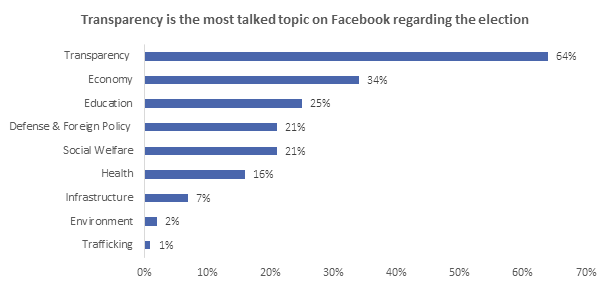 Source: Facebook/GMA |
|
Candidates positive on constitutional reforms to lift foreign ownership restrictions Perhaps the biggest deterrent in attraction of FDI’s in to the Philippines has been the so called 60-40 rule under the Filipino constitution, which limits the foreign equity ownership of local firms. While the general perception is of a 40% cap on ownership for foreigners, in reality the ownership restrictions vary across the industries. In general, 100% foreign ownership on enterprises is accepted unless the industry falls under the Foreign Investment negative List. However, despite the liberalisation of the foreign investment laws under the Aquino administration, several key growth industries such as; media, energy, telecommunications and land ownership still remain on the restricted boundaries for foreign investments. All candidates, except Roxas have been largely positive on the necessary constitutional reforms necessary to ease the foreign ownership restrictions. 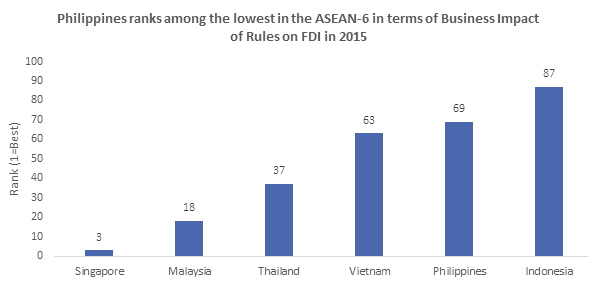 Source: World Economic Forum
Binay has vowed to amend the 40% baseline on the foreign investments, as a key priority in his economic plan. Binay expressed that under his administration the goal will be to liberalise the entry of foreign investments in prime economic sectors such as infrastructure, energy and telecommunications. However, indicated he is still uncertain on the right limits for foreign control. Poe in supporting the constitutional reforms stated that she will open up the foreign ownership for key industries such as media, utilities, academic institutions and the medical profession. However, she continues to remain stringent over restrictions on foreign land ownership in the Philippines. Perhaps the most open on his intentions has been Duterte, whom has agreed on a 30%-70% ownership platform in favor of foreign investors and remains positive over a 40-year lease of Filipino land to the foreigners, renewable for another 40-years. Roxas, however remains wary of the constitutional amendments, expressing that the constitutional restrictions is not what that confines foreign investments into the country, instead ranks red tape, corruption and tax policies as more bloating factors that keeps the investors away from the Philippines. Additionally he had expressed that a constitutional reform will put the potential investments in a “substantial pause” as the investors will follow a “wait and see” approach throughout the reform agenda, which could practically take up to three years to complete. Thus, suggesting constitutional reforms will not be a strategic priority under his administration. Overall, while the general sentiment on lifting the baseline on foreign ownership seems positive among the candidates, as Roxas himself have indicated, such amendments could only be probable over a substantial timeline. Thus, while lifting ownership restrictions could be the way forward for Philippines in drawing major investments into the country, a stable economic policy free from corruption and red tape will be the priority for the Philippines in maintaining the positive momentum for FDI in a post-election environment. |
Tax reforms unlikely in the near term given the priority for inclusive growth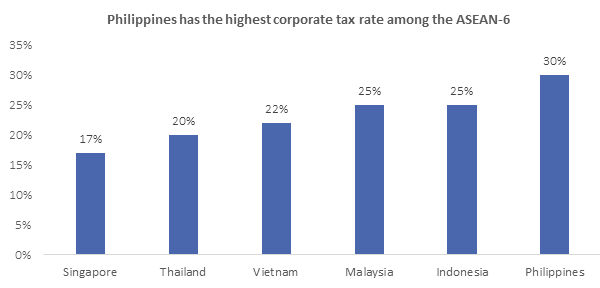 Source: Rappler
The Philippines currently has the highest corporate income tax rate of 30%, among the ASEAN-6. This was largely due to the fiscal consolidation efforts under the Aquino government, which saw the income taxes being held constant. Whereas other ASEAN peers such as Thailand (20% from 35% in 2010) and Vietnam (22% from 35% in 2010) in the recent years have invested in tax cuts in order to improve the competitiveness of its business environment. Incidentally Singapore, which has the highest foreign direct investments in ASEAN holds the most attractive corporate tax package. Candidates are split on the subject of tax reforms, with Poe and Binay supporting the corporate tax cuts, while Roxas and Duterte suggest otherwise. “The country’s tax system is uninviting as the region moves toward economic integration” Binay had expressed, indicating that reduced corporate income tax rates will entice foreign investors to do business in the Philippines. Binay has emphasized that the government should gradually, or within 5 years, reduce the current corporate income tax rate from 30% to a more realistic and reasonable rate that is consistent with the ASEAN peers. “We want to really be competitive when ASEAN economic integration happens. We have to be able to compete globally and make it enticing for investors to set up businesses here. Why would they want to do that if they have to pay a higher corporate income tax but with the less-than-ideal infrastructure that we can offer them?” said Grace Poe, running on a pro-tax reform agenda for the election. “It’s a zero sum game” said Roxas expressing his view on the tax reforms, hinting that in vowing to continue the efforts of Aquino on social security and poverty alleviation, a corporate tax cut might not be in his governments’ priorities. Standing on the same ground with Roxas on the tax reforms, Duterte said, “I need money for my programs to create jobs, solve criminality, hunger and restore peace and order. I need money to run this country”, indicating that corporate tax cuts will not be the strategy in boosting investments by either of the candidates. Even in the case of Poe and Binay, the timelines for tax reforms remains grey, as both have vowed on continuity of the social security platforms under the present administration, and the income for funding such initiatives at least in the medium term will be from the corporate tax revenues, as both candidates have already pushed for a reduction in personal income taxes for lower tax brackets. |
Government spending on infrastructure to rise with the outlook for regional developmentA major criticism of the Aquino administration was its apparent underspending on infrastructure projects, where the government was said to have underspent PHP 623 billion during 2010-2014, on the back of a stringent fiscal policy. In fact over the past decade, the budget allocation for infrastructure development was on average 2%-3% of the GDP, which saw Philippines lagging behind on key infrastructural platforms such as airports, power, roads, seaports, and telecommunications. As per the WEF Global Competitive Index of 2015, the Philippines was ranked lowest among the ASEAN-6 in terms of overall infrastructure quality. However, with a fiscal deficit of less than 1% of the GDP, all the candidates remain positive over increased spending on infrastructure development from the strong fiscal space created under the Aquino administration. “One mega project per region and one major project per province”, Binay highlighted on his plan for infrastructure development in an attempt to take the economic growth beyond the metro cities. Binay also expressed his intentions on spending 5% of the GDP on infrastructure development of the country while Poe calls for a government infrastructure budget of 7% of GDP. Roxas vows to continue and expand the Bottom up Budgeting (BuB) program under the Aquino administration, accordingly promising a budget of PHP 100 million per region under his administration. Whereas Duterte will put up economic zones in each region to create more jobs in the rural regions, such that under his presidency, every region would have an economic zone. In general, regional infrastructure development, led by the need for inclusive economic growth has been the baseline agenda of the presidential bids, which could in turn create a pro-investment backdrop outside the congested metro cities. The Aquino government initiated a number of public-private partnership (PPP) projects towards the end of its term, in an attempt to entice the private sector investment in large scale infrastructure projects. The number of PPP projects underway as of 2015 stands at 12, however out of which only two projects have been completed as of yet. Thus concerns have been raised on the fate of the PPP program post transition of power, as historically, pet infrastructure projects of the incumbent administration are either delayed or scrapped under a new political regime. Binay described the PPP program of Aquino “an epi-center of failure” owing to the delays in implementation and progress, however vowed on the continuity of the PPP platform with “better” implementation, minimizing its current inefficiencies. The rest of the candidates have also been largely positive on the continuity of the PPP plans, with Roxas as the stand bearer of Aquino regime and Poe, who looks into PPPs to develop the transport system of the country. Poe claimed that she would complete seven airports through PPP in the first half of her term and promises on the fast-track completion of the proposed MRT7, LRT6, Skyway 3, LRT2 East Extension, Northrail and Southrail projects. The promise of the candidates on the continuity and the fast track implementation of the PPP program, along with grander allocation from the budget on infrastructure development should bode well in opening up opportunities for potential investments in big-ticket state infrastructure projects under the new administration, with over 20 PPP projects already in the pipeline. |
Manufacturing, an investment priority among all candidates in a bid to ease unemploymentThe manufacturing sector topped the FDI into the Philippines in 2015, with net inflows of USD 772.7 million owing to a value share of 13.5% of the total net FDIs. The manufacturing sector constituted over 20% of the Philippines GDP in 2015, and outpaced the real GDP growth of 5.8% by growing at 8.0% YoY from 2014. The fortunes of the manufacturing sector is set to improve with the ASEAN best positioned to lure FDI from a slowing down China, with many investors seeking viable alternatives. The Philippines has been an attractive destination in particular for Japanese manufacturers, who have already doubled it’s the share of FDI inflows into the Philippines in 2015 from the previous year. “Manufacturing is important because it gives quality long term jobs”, says Roxas emphasizing on his promise to create six million jobs. Roxas intends on creating one million jobs each year within his six year term through attracting investments in to the manufacturing sector. Unemployment has been a focal topic among the candidates as Philippines continues to experience an unemployment rate of 7%-8% for the past decade, with further roughly 18% underemployed – despite the rapid economic growth. The unemployment in the Philippines have been largely driven by a weakening agricultural sector which has seen over 654,000 jobs being shed let alone in 2014. Following Roxas, both Binay and Poe also perceives investments into the manufacturing sector as a viable alternative and an immediate remedy for the country’s growing unemployment among the semi-skilled labour. In an attempt to boost the investments into the manufacturing sector, the candidates are focused on improving the energy platform in the country. The Philippines is currently among the highest in terms of energy costs in Asia, largely due to shortages in the power generation and supply. The Economic Intelligence Unit forecasts the demand for power in the Philippines will outpace the supply by 2020. As per Department of Energy estimates, the Philippines will need an additional 11,400 megawatts (MW) of generating capacity to meet the energy demand from 2016 to 2030. Additionally the Philippines continues to be the only country in the ASEAN which does not receive government subsidies for energy development, thus resulting in higher prices compared to the region. The solutions of the candidates for the energy crisis lies largely in the renewable energy sector. Roxas is to rely natural gas, citing that it is cheaper compared to other clean or renewable sources of energy and will considerably bring down the initial cost of investment compared to other renewable sources, which would eventually be passed on to the consumers defeating the purpose of coming up with stable and cheaper electricity. Poe, in her 20-point agenda for governance has emphasized that renewable energy development will be a key priority under her administration, which will also mandate power distributors to source a portion of their energy from renewable energy suppliers. Poe also remains positive on pricing reforms, in a measure to cut down on the higher energy costs in the manufacturing sector. Meanwhile, Binay calls for a five pillar platform to solve the energy crisis in the Philippines, targeting self-sufficiency in energy through private investments in natural gas and renewable energy. On a different note, Duterte plans on revitalization of the country’s steel industry by means of sustaining economic growth. The apparent steel consumption in the Philippines saw a rapid growth in recent years, increasing from 4.00 to 7.33 million metric tons in 2014, growing at a CAGR of 16.3% driven by the rapid infrastructure development and the construction activities within the country. However 80% of the steel demand in the Philippines continues to depend on imports despite sitting on over 300 million metric tons of iron ore reserves. Duterte claims the steel industry to become the backbone of industrialisation in the Philippines, through catering the needs of a wider range of industries that would depend on steel inputs – thereby opening up potential for steel and steel related industries in the Philippines. 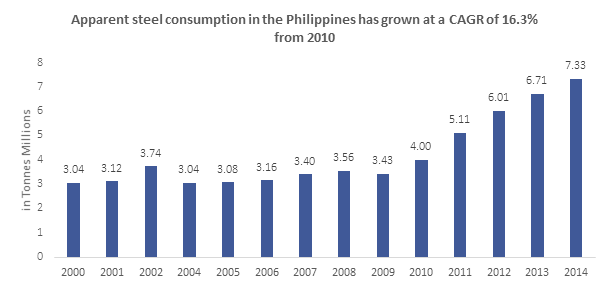 Source: Steel Statistical Yearbook |
The outlook for BPO sector remains positive as presidential hopefuls pledge state supportThe BPO sector has been the most attractive for foreign investments, which constitutes over 20% of the total FDI projects currently in operation in the Philippines. The BPO sector has been a major driver of the Filipino economy over the past decade, becoming the highest contributor to the GDP of the Philippines at 35% in 2015 from a mere 0.75% in 2000. 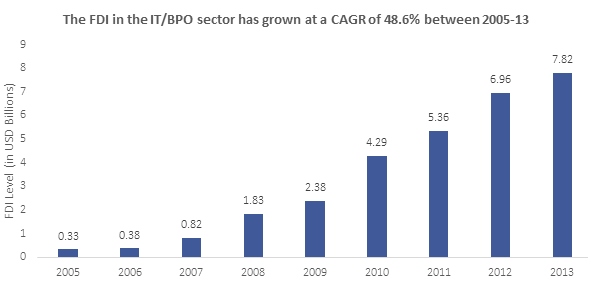 Source: The Bangko Sentral ng Pilipinas
Hailed as the “Father of the BPO industry in the Philippines” Mar Roxas vows the continuity of the support to the BPO sector of the country. Roxas as the Secretary of Trade & Industry from 2000-2003, initially drafted the campaign “Make IT Philippines”, which saw the platform to create the IT/BPO industry to grow, through infrastructure development, law making and global promotion of the industry. Thus, the BPO sector could expect to ascend under a Roxas administration. In fact the development and the protection of the BPO sector seems a common platform among all the candidates, as both Binay and Duterte have also prioritised the development of the BPO sector in their mandates. The Davao city under Duterte is already a leading BPO location in the world, ranking 66th in the world after Manilla (2nd) and Cebu City (7th). Binay considers the BPO sector to be a priority in terms of employment generation. Concerns were raised however, on the stance of Senator Poe on the BPO sector of the country; as the rumors on social media hinted the hostility of Poe towards the BPO sector. However, the Poe camp have fully denied such allegations, and have openly expressed support to the development of the industry. In fact, Poe has expressed her willingness to establish Dumaguete City as a hub for information and communications technology (ICT)-based industries to create more opportunities for graduates in the renowned university town. She emphasized that the local government can work closely with the ICT Association of Dumaguete and Negros Oriental in developing the ICT workforce of the city and providing free BPO training programs alongside university placement systems to facilitate an internship-to-employment system for the potential workforce. Poe has also emphasized on the need for faster and cheaper internet in the Philippines under her 20-point agenda, which would be a key infrastructural requirement for the expansion of the IT/BPO sector in the Philippines. According to the Internet metrics provider Ookla, the Philippines ranked 21st out of 22 countries in Asia with the slowest Internet download speed, evident of the poor IT infrastructure in the Philippines. The prospects for the BPO sector in the Philippines continue to remain bullish with the Philippines Competitive Report for 2015 by Deloitte projecting the industry to grow a CAGR of 17% to reach a target of USD 48 billion in revenue by 2020, accounting for 20% of the global industry value. Deloitte further expects the BPO sector to diversify from the largely call-center dominated operations to other services such as healthcare information management, gaming, and animation. |
Candidates to follow a pro-mining agenda amidst the pressure from green groupsPhilippines is considered to be the 5th most mineral-rich country in the world for gold, nickel, copper and chromite worth reserves over USD 840 billion. However, since 2011, government has not actively pursued investments in mining and mineral development, opting to focus on reviewing the current fiscal regime for mining. In 2012, mining was excluded from the government’s Investment Priorities Plan (IPP) and all incentives to the industry under the Mining Act and the National Internal Revenue Code have been removed. The policy change was premised on the notion that government’s share in revenues from the mining industry were significantly lower compared to the cost of the environmental depletion brought about by mining activities. President Aquino issued an Executive Order in 2012, forbidding the signing of new mineral agreements until a new mining revenue sharing scheme was legislated. The Mining Industry Coordinating Council introduced a higher tax on the mineral industry in 2015, of 10% of the gross sales or a 55% share in net revenues, however has not been legislated yet. Binay openly criticised the present government for putting the mining industry in a “limbo”, and expressed his support towards responsible miners, while raising the concerns that the proposed higher taxes will further deteriorate the global competitiveness of the Filipino mining industry. However environment groups continue to urge the public not to vote for “pro-mining” candidates in the elections, tagging Roxas and Binay in their campaign. “If these candidates will be elected, we expect an increased entry and operation of foreign and big mining companies who will further grab our lands, destroy our ecosystems, and plunder our resources,” said Clemente Bautista, National Coordinator of the Kalikasan People’s Network for the Environment, one of the convening organizations in the campaign. On a different note, Duterte recently accused Roxas of being supported by billionaire businessman Eric Gutierrez, CEO of SR Metals, Inc., a controversial mining firm which was subjected to a Senate investigation for the allegedly illegal shipment of nickel ores. Additionally Roxas’s Statement of Assets, Liabilities and Net worth (SALN) reveals that Roxas has business interests and financial connections in seven different mining corporations, hence being rightly accused by the environmental groups for his pro-mining agenda. However despite not being accused of a pro-mining agenda, both Poe and Duterte have also expressed that they will support responsible mining under their administrations. Duterte stated that he will be supportive for mining but under the stringiest of environmental standards, and even showed willingness on leasing out land and islands for the developers for 30 to 50 years and a revenue sharing scheme up to 30%-70% in favor of the investor. Overall, all presidential bids have shown their keen interest in exploiting the untapped potential of the mining industry as one of the country’s next boom sectors. |
